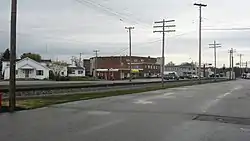Ohio and Mississippi Railway
The Ohio and Mississippi Railway (earlier the Ohio and Mississippi Rail Road), abbreviated O&M, was a railroad operating between Cincinnati, Ohio, and East St. Louis, Illinois, from 1857 to 1893.


The railroad started in 1854 and paralleled the Cincinnati and Whitewater Canal. Its East St. Louis terminal near the Mississippi River was completed in 1857. It was a founding rail line of the Terminal Railroad Association of St. Louis. General Ormsby M. Mitchel (d. 1862) was a civil engineer on this project.[1]
On September 17, 1861, during the American Civil War a train carrying union troops fell through a sabotaged bridge at Huron, Indiana, injuring or killing 100.
On October 6, 1866, the Adams Express Company car was robbed by the Reno Gang just east of Seymour, Indiana, becoming the first train robbery in U.S. history. The insolvent Ohio and Mississippi Railroad was reorganized in 1867 as the Ohio and Mississippi Railway.
When originally built the Ohio & Mississippi was built to the six foot (6’) broad “Erie Gauge.” For a time a connection with a dual gauge section of the Cincinnati Hamilton & Dayton (CH&D), Atlantic Great Western (AGW) and the Erie Railway allowed travel on the Great Broad Route of Erie Gauge from St. Louis to New York City.[2][3] In one day in 1871, Sunday, July 23, 1871, 400 miles of the Ohio & Mississippi was converted to standard gauge.[4]
The line came under the influence and later control of the Baltimore & Ohio Railroad, and combined with the former Marietta & Cincinnati connecting to the B&O at Parkersburg, West Virginia formed a continuous line between St. Louis and the east coast at Baltimore and Washington, DC. For many years, one of B&O’s premier trains, the National Limited, traveled this route.[5]
It merged in 1893 with the Baltimore and Ohio Southwestern Railway, and is now part of CSX Transportation's Indiana Subdivision and Illinois Subdivision.
References
- Goss, Rev. Charles Frederick (1912). Cincinnati: The Queen City. Cincinnati: The S. J. Clarke Publishing Company. pp. 186–187.
- Reynolds, William, Peter K. Gifford, and Robert D. Ilisevich. European Capital, British Iron, and an American Dream: The Story of the Atlantic & Great Western Railroad (The University of Akron Press, 2002).
- See Erie’s Narrow Gauge, Cincinnati Commercial, Jan. 4, 1879
- Charles Frederick Carter,"Vagaries of Railroad Evolution: The Riddle of the Gauge." 1928, Lecture delivered to New York Athletic Club.
- Harry Stegmaier, Route of the National Limited (Baltimore & Ohio Passenger Service, 1945-1971, Vol 1) 1997
Further reading
- Haslett, Charles (September 1855). Hackley, Charles W. (ed.). The Mechanic's, Machinist's, Engineer's Practical Book of Reference: Containing tables and formulæ for use in superficial and solid mensuration; strength and weight of materials; mechanics; machinery; hydraulics, hydrodynamics; marine engines, chemistry; and miscellaneous recipes. Adapted to and for the use of all classes of practical mechanics. Together with the Engineer's Field Book: Containing formulæ for the various of running and changing lines, locating side tracks and switches, &c., &c. Tables of radii and their logarithms, natural and logarithmic versed sines and external secants, natural sines and tangents to every degree and minute of the quadrant, and logarithms from the natural numbers from 1 to 10,000. New York, USA: James G. Gregory, successor of W. A. Townsend & Co. (Stringer & Townsend). Retrieved 2017-08-13.
[…] Still there would be much labor of computation which may be saved by the use of tables of external secants and versed sines, which have been employed with great success recently by the Engineers on the Ohio and Mississippi Railroad, and which, with the formulas and rules necessary for their application to the laying down of curves, drawn up by Mr. Haslett, one of the Engineers of that Road, are now for the first time given to the public. […]
1856 edition
External links
- Ohiohistorycentral.org
- The Rebellion the United States by Jennett Blakeslee Frost - 1862
- Historic American Engineering Record (HAER) No. IN-5, "Ohio & Mississippi Railroad, Repair Shops, Van Trees & Seventeenth Streets, Washington, Daviess County, IN", 34 photos, 7 data pages, 2 photo caption pages